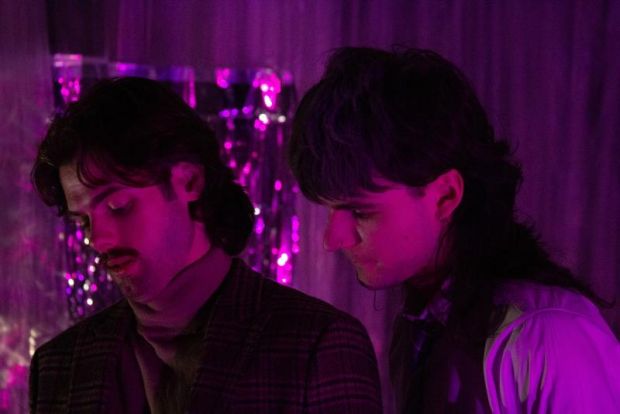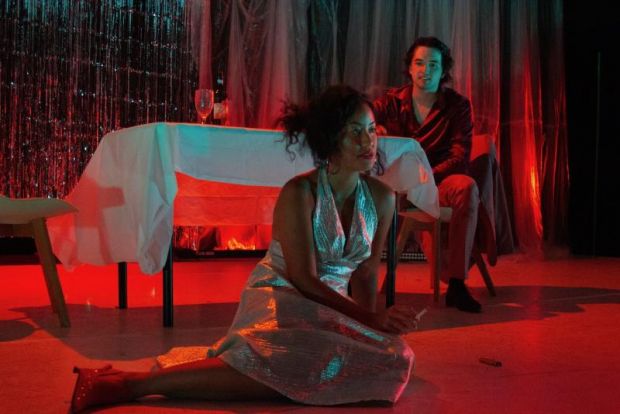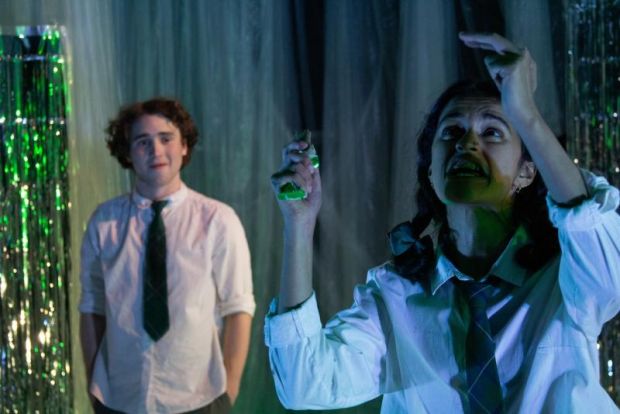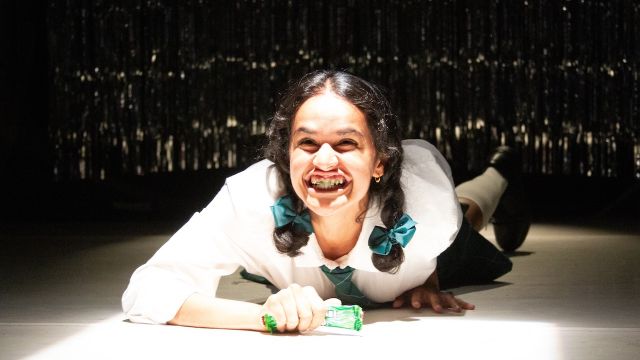Home Economics
Here is a considerably revised version of Declan Greene’s 2009 play, Home Economics. Now the play features just three pieces (sketches?). Filipe Filihia’s set is all gauze and glittering silver curtains – a shimmering, glitzy, show biz look for the very black humour of the show overall. All three pieces feature food of a sort (candy bars, sausage rolls, tomato sauce, wine, restaurant food that never arrives, and flour - with one character a high school home economics teacher).
In the first piece, a schoolgirl works in the school tuckshop. She is so addicted to sugar that all her teeth have rotted away. She has an impossible crush on the school spunk – a boy who likes a sausage roll, no sauce. He is repulsed by the stench of her decayed teeth. Worse, the girl ruins whatever chance she might have had; she is so dazzled by her love-object that she smothers his sausage roll in sauce… Candy bars, fruit, smashed sausage rolls and dripping tomato sauce soon litter the stage and the actors.

In the second, we see a reversal of power: a high-powered and important, or self-important businessman takes a call girl to dinner in what we take to be an expensive restaurant. She is calmly and resolutely unimpressed by all his efforts to dominate and intimidate her. He resorts to masturbation. Much wine is drunk, and sloshed about, but the waiter never arrives – despite the man or the woman constantly ringing a bell. The bell itself interrupts their frustrating exchanges and, each time with a brief blackout, as in a series of jump cuts, the situation moves to another dead-end moment – until they are exhausted...
The third piece again features a reversal. At a same-sex boys school, a schoolboy is the creepy predator, relentlessly pursuing his gay home ec teacher. Mildly amusing – at first. Teacher resists but is disturbed, even tempted – but he knows that he can only keep his job by appearing to ‘hate boys’. At home he is pre-occupied but his partner, who’s given to smother-love and loves to cook, is oblivious. He describes them both as ‘bears’. (Casting is strange: neither one of the two actors is in any way a ‘bear’.)

The last Declan Green play I saw was Moth - which was insightful, truthful, moving and clear in its intentions. It showed great sympathy for its outcast characters – and indeed the characters were the point.
Of course, a playwright is not obliged to imbue every piece with those qualities, but Home Economics, for me, has none of them. The writing is unfocussed, repetitious, obscure and cold. It is trying to be absurd, but it’s really just silly. Nor is it funny. My audience was willing to laugh - the toothless schoolgirl was met with gales of laughter. But laughter seemed to die away and was succeeded by bemused or even stony silence. The restaurant scene, for instance felt interminable.
A program note asserts that ‘these short works reveal the writer’s genuine fondness for his characters’. On the contrary, what I saw on stage was an easy misanthropy.

Is there an intention to shock with all that food being flung about? We do recoil – a bit - but the connections to the situations are beyond tenuous, and we’re puzzled and irritated rather than shocked. Is there also an intention to subvert cliches and cultural norms? But what we get is high school (at best) humour of the most obvious kind. But Declan Green is an esteemed – if in your face iconoclast – theatre maker, known for his own work and that with Sisters Grimm. But 2009 is a long time ago. Home Economics is an early, starting-out work, albeit revised here. Why revise it?
Clearly, I am missing something, or I am just not in the niche for which this is intended. Home Economics was director Stephanie Lee’s VCA graduation show, and she had a sold-out three-day season with it.
Michael Brindley
Photographer: Ronin Green
Subscribe to our E-Newsletter, buy our latest print edition or find a Performing Arts book at Book Nook.

